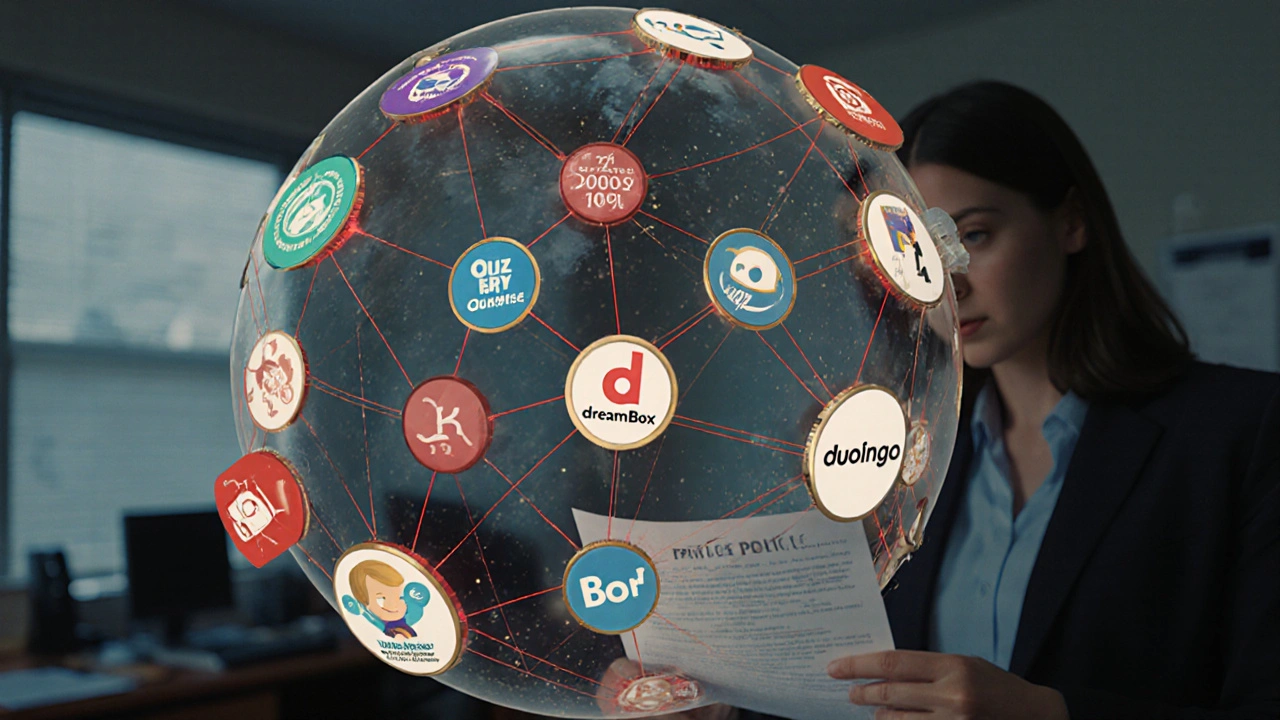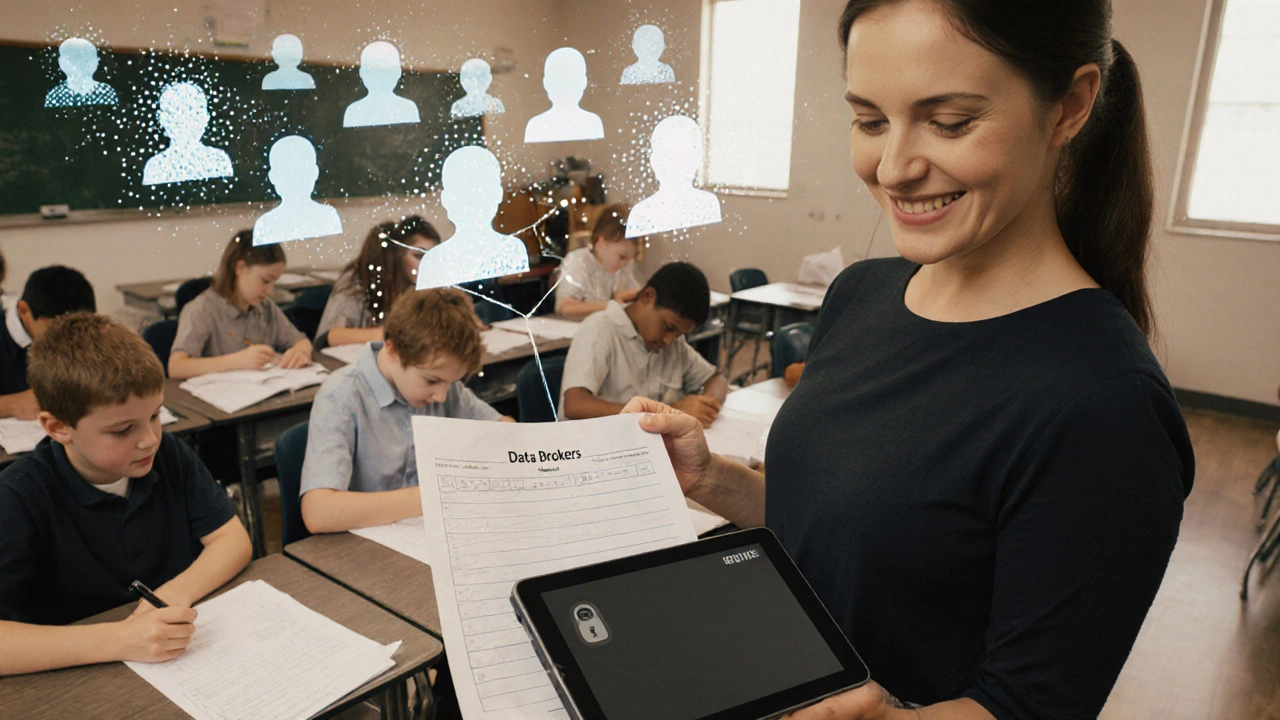When a student logs into their learning platform, the system already knows what they struggled with last week, which videos they watched twice, and even how long they paused before answering a quiz. It serves up the next lesson like a personal tutor who’s read their mind. That’s the power of personalized learning. But behind that smooth experience is a mountain of sensitive data - and not everyone knows what’s being collected, who has access, or how long it’s stored.
What Personalized Learning Collects - And Why It Matters
Personalized learning systems don’t just track grades. They monitor mouse movements, time spent on each question, how often a student re-tries a problem, which hints they click, and even when they log off frustrated. Some platforms record voice responses in language lessons, facial expressions during video proctoring, and typing patterns to detect if someone else is taking the test.
This data helps the system adapt. If a student keeps missing fraction problems, the system might offer more visual aids or slower-paced explanations. If they breeze through algebra but stall on word problems, it shifts focus. That’s useful. But each click, pause, and retry becomes a data point - and data points can be stitched together to build a detailed profile of a learner’s habits, emotional responses, cognitive strengths, and weaknesses.
That profile isn’t just for improving lessons. It’s often sold to third-party vendors, used for research, or shared with school districts for funding decisions. In some cases, it’s even used to predict future academic success - and that’s where privacy risks become real.
Who Owns Student Data?
Most parents assume their child’s school owns the data. But in most cases, the school only licenses the software. The real owner is the company behind the platform - ThinkCERCA, Khan Academy, DreamBox, or any of the dozens of adaptive learning tools used in K-12 and higher ed.
These companies often include broad data-sharing clauses in their terms of service. Many claim they "anonymize" data before selling it to ed-tech researchers or advertisers. But anonymization is often a myth. Combine a student’s quiz history, location data from their device, and their name in a parent portal, and re-identification becomes easy. A 2023 study by the University of Michigan showed that 92% of "anonymized" student datasets could be linked back to individuals using just three data points.
And there’s no federal law in the U.S. that fully protects student data in private platforms. FERPA covers public schools, but only when the school itself holds the data. If a third-party vendor holds it, FERPA doesn’t apply. That leaves families with little recourse.
The Hidden Costs of "Free" Tools
Many schools use free versions of learning platforms because budgets are tight. But "free" doesn’t mean cost-free. It means the product is paid for with student data. Platforms like Quizlet, Duolingo, and even Google Classroom collect behavioral data that’s used to train AI models - models that then power commercial products elsewhere.
Imagine a student learning Spanish on Duolingo. Their mistakes, speed, and retention patterns are fed into a model that improves Duolingo’s language algorithms. But those same patterns could also be used to train a mental health AI that predicts anxiety based on typing rhythm - and sold to an insurance company. There’s no law stopping that. No transparency. No consent.
Even when schools sign contracts with vendors, those contracts rarely specify how long data is kept, who can access it, or what happens after a student graduates. Some platforms retain data indefinitely. Others sell it to data brokers who resell it to marketers targeting college-bound teens.

How Schools Are Failing Students
Many schools rush to adopt personalized learning tools because they promise better outcomes. But few have the technical staff to audit data practices. Teachers aren’t trained in privacy law. IT departments are overloaded. Parents rarely read the 40-page terms of service.
A 2024 survey of 200 U.S. school districts found that 78% had no formal policy on how student data from third-party apps is handled. Only 12% required vendors to delete data when a student leaves the district. And just 5% allowed parents to request a copy of their child’s full data profile.
Worse, some districts require students to use specific platforms as part of the curriculum. No opt-out. No alternative. If your child refuses to use the platform, they’re penalized academically. That’s not choice - it’s coercion.
What You Can Do - As a Parent, Teacher, or Student
You don’t need to reject technology. But you do need to ask the right questions.
- Ask the school: "Which third-party vendors do we use? Can we see their privacy policies?" If they can’t answer, push back.
- Check for COPPA and FERPA compliance: If the tool collects data from children under 13, it must follow COPPA. If it’s used in a public school, FERPA should apply. Demand proof.
- Request data deletion: Under state laws like California’s CCPA or Virginia’s VCDPA, parents can request their child’s data be deleted. Don’t assume it’s automatic.
- Use open-source tools: Platforms like Moodle or Open edX give schools full control over data. They’re harder to set up, but they don’t sell your child’s behavior.
- Opt for local storage: Some tools let you download lessons and use them offline. That means no data leaves the device.
Teachers can also push for simpler tools. A well-designed worksheet with feedback can be more effective - and safer - than a platform that tracks every keystroke.

The Future Isn’t Just About Security - It’s About Ethics
Privacy isn’t just about preventing hacks. It’s about preventing exploitation. When a system learns your child is anxious during timed tests, should that information be used to adjust their curriculum - or to label them as "at-risk" in a database that follows them into college applications?
There’s a line between personalization and profiling. Personalization helps. Profiling harms. And right now, most platforms cross that line without permission.
True adaptive learning should adapt to the student - not turn the student into a product. The goal isn’t to predict what a child will do next. It’s to help them learn how to think for themselves.
That requires boundaries. It requires transparency. And it requires us to stop treating student data as a free resource.
What Needs to Change
Change won’t come from schools alone. It needs policy, public pressure, and corporate accountability.
- Stronger federal laws: The U.S. needs a student data protection act that applies to all vendors, not just public schools.
- Independent audits: Schools should require third-party vendors to submit annual privacy audits by certified experts.
- Data minimization: Platforms should collect only what’s necessary to improve learning - not everything they can.
- Parental control dashboards: Every student should have a portal where parents can see what data is collected, who it’s shared with, and how to delete it.
- Student rights: Older students should be able to consent to data collection themselves - not just their parents.
Some countries are ahead. The EU’s GDPR for children requires explicit parental consent and strict limits on profiling. Canada’s PIPEDA gives families the right to know how their child’s data is used. The U.S. is falling behind.
Final Thought: Learning Shouldn’t Cost Your Privacy
Personalized learning has real promise. But it’s built on a foundation of trust - and that trust is being broken.
Every time a student clicks "Next," they’re handing over a piece of themselves. The question isn’t whether the system works better with that data. The question is: should they have to give it up at all?
It’s time to demand learning tools that respect students as people - not data points.
Do schools legally own my child’s learning data?
No. Schools typically license the software, but the data is owned by the platform provider. FERPA only protects data held directly by the school - not data stored by third-party apps like Khan Academy or DreamBox. That means the company can use, share, or even sell that data unless restricted by state law or contract.
Can I opt my child out of personalized learning tools?
It depends. Some schools allow alternatives, like paper assignments or non-digital platforms. Others require the use of specific apps as part of the curriculum. If your child is penalized for refusing, that’s a red flag. You can request a written policy on opt-outs - and if denied, file a complaint with your state’s education department.
Is anonymized student data really safe?
Not really. A 2023 University of Michigan study showed that 92% of "anonymized" student datasets could be re-identified using just three data points - like quiz timing, error patterns, and device type. Even if names are removed, behavioral fingerprints are unique enough to track individuals across platforms.
What’s the difference between personalized learning and student profiling?
Personalized learning adjusts content to help a student learn better - like offering extra practice on fractions. Student profiling builds a long-term digital record of behavior, emotions, and potential - and uses it to predict outcomes, assign labels, or sell insights. The first helps. The second exploits.
Are there privacy-safe alternatives to commercial learning platforms?
Yes. Open-source platforms like Moodle and Open edX let schools host data on their own servers, giving full control. Some districts use locally developed tools that don’t collect behavioral data at all. These require more setup, but they eliminate third-party data risks. Ask your school if they’ve considered these options.



Comments (11)
James Boggs November 28 2025
Excellent breakdown. The distinction between personalization and profiling is critical-and too often blurred by vendors who profit from ambiguity.
Lissa Veldhuis November 29 2025
So let me get this straight-we’re letting corporations mine our kids’ anxiety patterns like they’re mining lithium and then selling it to insurers? This isn’t education, it’s data slavery.
Gabby Love November 30 2025
Just a heads-up: if your school uses Google Classroom, check the data processing agreement. Many districts overlook that Google’s TOS still allows behavioral tracking even in ‘education mode.’
allison berroteran December 1 2025
I’ve been teaching for 18 years, and I’ve seen tech come and go. What worries me isn’t the tools-it’s that we’ve stopped asking whether they’re helping children think, or just making them easier to predict. A student isn’t a dataset. They’re a person learning how to be one. If we’re not careful, we’ll train them to perform for algorithms instead of discovering themselves.
Addison Smart December 2 2025
This is a global issue, and the U.S. is falling dangerously behind. In Canada, we have PIPEDA, which treats student data with the same gravity as medical records. In the EU, GDPR for minors requires explicit consent and prohibits profiling for commercial purposes. Here? We let companies write the rules because they’re ‘free’ and ‘innovative.’ But innovation without ethics isn’t progress-it’s exploitation dressed in code. Schools need independent auditors, not sales reps with PowerPoint decks. And parents? You’re not being paranoid-you’re being responsible. Demand transparency. Demand deletion rights. Demand that your child’s learning journey doesn’t become someone else’s training data.
selma souza December 2 2025
The article is well-researched, but the tone is unnecessarily alarmist. Data collection is standard in modern software. If parents don’t read the terms, that’s their fault, not the vendor’s.
Jen Kay December 2 2025
Oh, so now it’s the parents’ fault for not reading 40-page legal jargon written in 6-point font? Let me guess-your kid’s school also uses a platform that tracks eye movements during quizzes. And you’re okay with that? Because, you know, ‘it’s just data.’
David Smith December 4 2025
Who cares? Kids are on TikTok all day. This is nothing. Let the companies have the data. The real problem is that schools don’t teach kids how to code. Fix that first.
Michael Thomas December 5 2025
USA > EU. We don’t need European rules. Free market innovation wins. Stop crying about data.
Abert Canada December 7 2025
Man, I live in Canada and we’re still struggling with this. My daughter’s school uses DreamBox. I asked for her data log. They said it’s ‘not available.’ Guess what? I filed a PIPEDA request. Got it back in 10 days. 37 pages of behavioral logs. Including her typing speed during math quizzes and how long she stared at the screen before giving up. It’s creepy. And legal. We need to do better.
Michael Jones December 8 2025
We’re so obsessed with measuring everything we forgot to ask why we’re measuring it. Is the goal to help kids learn-or to turn them into marketable patterns? Every click, every pause, every frustrated sigh is being turned into a commodity. But what’s the soul of learning if not the quiet moments of confusion that lead to breakthroughs? Those can’t be optimized. They can only be witnessed. And if we’re not careful, the machines will never learn to witness anything at all.